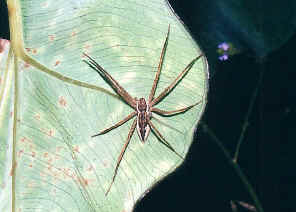Hunting Spiders
This page contains pictures and information about Hunting Spiders that we found in the Brisbane area, Queensland, Australia. For Web Building Spiders, please visit our Web Building Spiders web site.

- Followings listed the hunting spider families that we found up to this moment. For web building spiders, please visit our Web Building Spiders web site.
- We also has the Quick Field Guide of spiders found in Brisbane. This includes most of the common species found in Brisbane near-by area and South East Queensland, Australia.
-
 Family: Hersiliidae,
Two-tailed Spiders
Family: Hersiliidae,
Two-tailed Spiders
- Two-tailed Spiders are small spider and easily identified because of their long 'tails'. They are common but hard to find. They are heavily camouflaged. The spiders body is flat and with the pattern of bark. Their legs are long. The two tails are their spinners which lay silk to trap their prey.
-
 Family: Oxyopidae, Lynx spiders
Family: Oxyopidae, Lynx spiders
- They are long legs spiders, usually small in size. They have eight eyes, in the pattern of four rows of two as below.
-
 Family: Lycosidae, Wolf spiders
Family: Lycosidae, Wolf spiders
- The spider that you see wandering across the garden path or between plants is quite likely a common Wolf Spider. These spiders are real hunters and have very good eyesight. They are fast moving, hunting in the open ground. They are usually dull grey or brown in colour.
-
 Family: Pisauridae,
Water Spiders
Family: Pisauridae,
Water Spiders
- The spiders in this family live at water edge of creeks and ponds. They are sometimes called Nursery Web or Fishing Spiders. They can run across water surface and dive under water after prey. Water Spiders have eight eyes on their head in two rows of four.
-
 Family
Zodariidae - Ground Hunting Spiders
Family
Zodariidae - Ground Hunting Spiders
- Spiders in this family are small to medium in size. They are brown or dark brown in colours with white or yellow spots pattern on abdomen. They are usually found hunting on ground.
-
 Family
Miturgidae - Long-legged
Sac Spiders
Family
Miturgidae - Long-legged
Sac Spiders
- Family Miturgidae is newly separated from family Clubionidae. They had eight legs arranged in two rows.
 Family: Corinnidae, Sun spiders
Family: Corinnidae, Sun spiders- Some spiders in this family mimic ants. Their legs are usually long and slender. Most corinnids live in leaf litter or on dry bark of trees. They hunt on open ground and tree trunk.
-
 Family:
Salticidae, Jumping spiders
Family:
Salticidae, Jumping spiders
- This is a very large family contains the most colourful species of spiders. They are easily recognized by their eyes pattern. They have very good eyesight and very active. Each species in this family have different colourful patterns on their bodies.
-
 Family Selenopidae - Wall Crab Spiders
Family Selenopidae - Wall Crab Spiders
- Family Selenopidae is a small family. Selenops is the only genus in this family and Selenops australiensis is the only species in Australia. They look like huntsman spider except that they only has six eyes instead of eight. The six eyes are in one row.
-
 Family: Sparassidae, Huntsman Spider
Family: Sparassidae, Huntsman Spider
- They are medium to large spiders, usually with flat body and legs are held in forward crab-like position. They have eight eyes in two rows of four.
-
 Family: Thomisidae, Crab spiders
Family: Thomisidae, Crab spiders
- They are commonly called Flower Spider or Crab Spider. They are small to medium size with colour of green, yellow, white brown and grey. They are not hairy. All of them have eight eyes in two rows of four.
-
 Unknown Hunting
Spiders
Unknown Hunting
Spiders
- There are some spiders that we cannot identify in this page.
- For Spiders that build web, please visit our Web Building Spiders web site.
- Reference:
- 1. A Guide to Australian Spiders - Densey Clyne, Melbourne, Nelson 1969.
- 2. Australian Spiders in colour - Ramon Mascord, Reed Books Pty Ltd, 1970.
- Back to top
All spiders has their silk glands at their bottom of their abdomen, the back side of their body. Some spiders build webs and some do not. This page is about those spiders that do not build any kinds of web.
All spiders use silks to make egg sac to protect their young.
